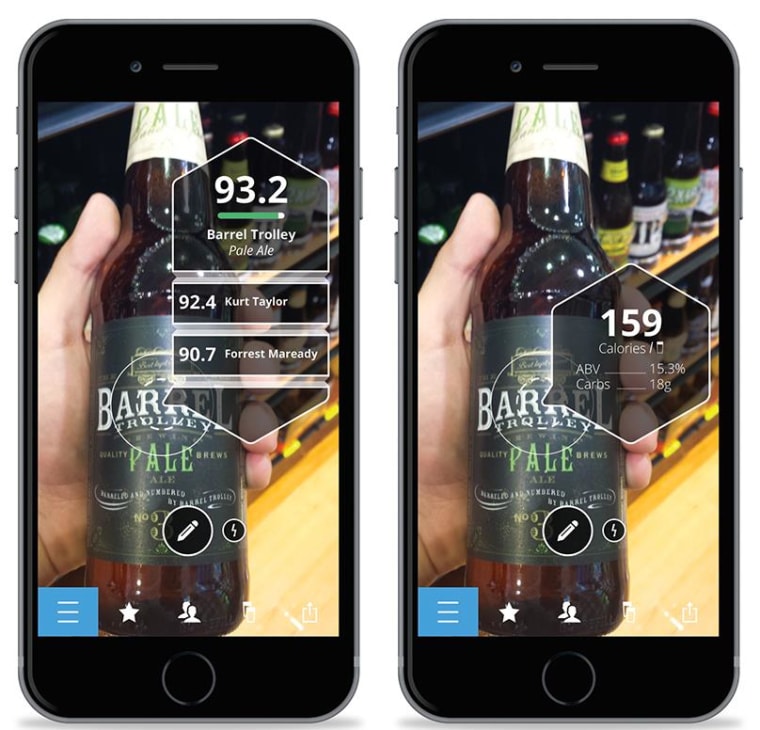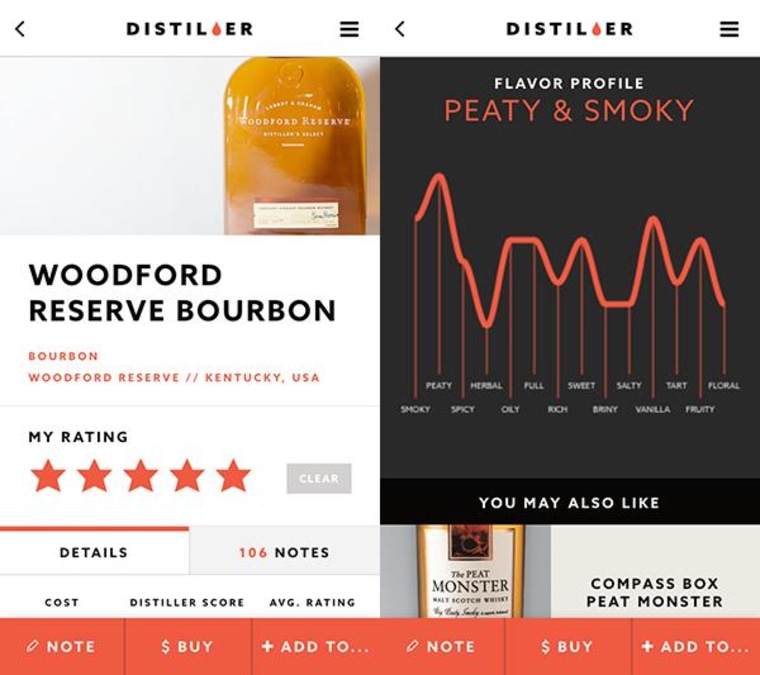Looking for your next favorite drink? It might be as simple as opening a beer, wine or liquor discovery app on your smartphone.
Drinking used to be simple: People stuck to Budweiser and Jack Daniels. Now rare Danish beers are fetishized at tony New York restaurants and whiskey nerds fight over bottles of Pappy Van Winkle like it's the last "Tickle Me Elmo" at Christmas.
Into this landscape comes Next Glass, an iPhone app launched on Thursday that claims it can predict what kind of beer or wine you will love most. It's not alone. Delectable, for wine, and Distiller, for whiskey, also serve up recommendations.
"Taste is really a hard thing to define," Kurt Taylor, CEO and founder of Next Glass, told NBC News. "We figured the way we could do that is through objectively defining each bottle of wine and beer through its chemistry."
From the bar to the lab
With Next Glass, users simply point their phone's camera at a bottle of beer and the app will scan and recognize it within seconds. (Unlike other recommendation apps, there is no need to snap or upload a picture).
The result: a personalized score that Next Glass claims can predict with 96 percent accuracy how much someone will love a beer or wine. For those aiming to be thin and sober, it also provides a calorie count and alcohol by volume (ABV) level.

It's all presented with an augmented reality interface, meaning the score will float close to the bottle as you move it around.
It certainly looks cool. But if taste is subjective, how does Next Glass come up with what it claims is a definitive score?
By running around 200 beer and wine samples through a mass spectrometer in its lab in Wilmington, North Carolina, every day. It identifies thousands of chemical compounds in each sample, uploads those into its database, and then uses that to provide a personalized score based on beers and wines that you have rated.
While you might know you like IPAs in general, the chemical analysis can really break down what is different about each one, Taylor said. Luckily for the neighbors, Next Glass only needs a small sample
"We take out about 2 milliliters from each bottle, so we have a lot left over," Taylor said. "We make a lot of friends."
Drunk on data
With around 20,000 different brews in its database, Next Glass really excels at identifying beer. Wine is a little harder. The sheer number of wineries across the world — along with the fact that each year brings a new and distinctive vintage — makes it difficult to catalog each one.
Delectable instead relies on the wisdom of crowds. The app lets people scan, rate and share photos of wines they are drinking. All of that data — along with expert recommendations — helps them track what is "trending" in the world of wine.
It also lets users see what their friends are drinking and provides traditional editorial lists from sommeliers and other wine professionals. (Current categories featured on the app: "Thanksgiving" and "Nebbiolo").
"We get this macro view of what people are excited about, as well as a micro view with some hidden gems," Julia Weinberg, director of partnerships and brand development at Delectable, told NBC News.
What if you prefer the brown stuff? Distiller, released for iOS and Android earlier this year, has served up 3 million whiskey recommendations since it was launched.
It relies on whiskey experts (bartenders, liquor distributors, etc.) to write reviews and create tens of thousands of "flavor data points," Distiller CEO Mikael Mossberg told NBC News.

Once a user has rated whiskeys he or she likes, the app searches its database to find something with a similar flavor profile.
"Bars, especially those with large whiskey collections, can be kind of intimidating," he said.
This helps people narrow down their choices without having to bend the ear of busy bartenders, he said, noting that some of them have been using the app to make their own recommendations.
Ultimately, the only way to know if you will like something is to taste it. When it comes to beer, experimenting often means plopping down $6 for an unknown microbrew. Wine and whiskey, however, is very different.
"Trying something new can be an expensive mistake," Mossberg said.
What do the experts think about these apps? Becki Kregoski is a Certified Cicerone, which is like a sommelier, but for beer. It's her job to introduce new beers to people in Colorado — a state that trails only California and Washington in number of craft breweries.
"Personally, I believe that apps can steer a person in the right direction when looking for a certain style of beer," she told NBC News.
Still, she said, there is an art to guiding someone towards the right beer that apps can't match.
"I've had a few experiences where I take someone through a sampling of different beers in an attempt to find a brew they like and a certain aroma reminds him or her of a nostalgic memory from the past," she said.
"It may be over the top, but I've never failed at finding a beer for a customer when utilizing scent memory recall. Once an app can do that, my answer may change."